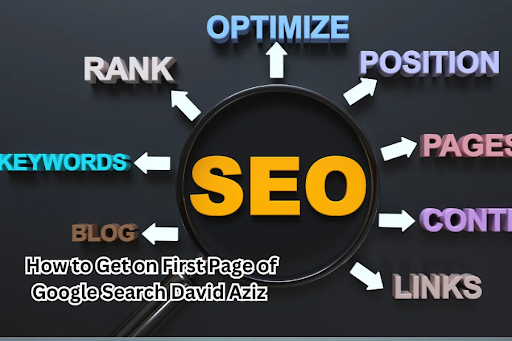How to Get on First Page of Google Search David Aziz
The internet is a vast ocean filled with billions of web pages, all vying for visibility. For website owners, landing on the first page of How to Get on First Page of Google Search David Aziz is not just a milestone—it’s often the difference between being noticed and being overlooked. Most users rarely scroll past the first page, making it prime digital real estate. So, the pressing question is: how can your website claim one of these coveted spots? Let’s explore strategies and insights that can help you achieve this goal.
Decoding Google’s Search Algorithm
How to Get on First Page of Google Search David Aziz mission is to deliver the most relevant and high-quality search results to users. To do this, its algorithm evaluates hundreds of factors. Although the exact formula remains a closely guarded secret, experts have identified key components:
- Crawling and Indexing: Google uses automated programs known as “crawlers” to scan web pages, follow links, and index content. This means your site must be easily discoverable and properly linked for Google to understand its relevance.
- Relevance and Authority: Pages are ranked based on their relevance to the search query and their authority within the subject area. Factors like user engagement, content quality, and page speed play a significant role.
- Content Analysis: The algorithm prioritizes content that is original, valuable, and addresses user intent. Keywords, structure, and usability are essential to rank well.
Understanding and aligning with these principles lays the foundation for improving your website’s visibility.
The Role of SEO in Google Rankings
How to Get on First Page of Google Search David Aziz of enhancing your website to make it more accessible, useful, and relevant for search engines. Here are some critical SEO activities that can help you rank higher:
Keyword Strategy
Keywords are the backbone of SEO. These are the terms and phrases users search for when seeking information. Tools like Google Keyword Planner, SEMrush, and Ahrefs can help you identify keywords with high search volumes and manageable competition.
Integrate these keywords naturally throughout your content—titles, headings, body text, and metadata—while ensuring readability. Aim for a balance between optimization and a natural writing style.
On-Page Optimization
On-page SEO involves making adjustments to your website’s internal elements, including:
- Crafting compelling meta descriptions and title tags.
- Using proper header tags (H1, H2, etc.) for clear content hierarchy.
- Optimizing image alt text and URL structures.
- Creating internal links to improve site navigation and distribute link equity.
- By refining these elements, your website becomes more organized and user-friendly, which Google rewards.
Mobile-Friendly Design
With mobile devices driving a significant portion of web traffic, optimizing for mobile users is non-negotiable. Google’s mobile-first indexing prioritizes the mobile version of your site for ranking purposes.
- Use responsive design to ensure your site adapts to various screen sizes.
- Focus on fast loading times and smooth navigation to enhance the user experience.
High-Quality Content Is Key
Content is king in the SEO world and remains a critical factor for ranking success. Google values content that is:
- Fresh and Updated: Regularly updated content signals relevance.
- Engaging and Valuable: Provide insights, solve problems, and keep readers engaged.
- Diverse: Incorporate various formats like blogs, videos, infographics, and podcasts.
Avoid keyword stuffing and instead write naturally while weaving in essential phrases that align with user intent. Additionally, content structured around answering questions or solving problems tends to perform well.
Building Authority with Backlinks
Backlinks—links from other websites to yours—act as endorsements of your site’s credibility. However, not all backlinks are created equal. Google values quality over quantity, so focus on obtaining links from authoritative and relevant sites in your niche.
Strategies to build backlinks include:
- Guest blogging on reputable websites.
- Creating shareable content like research studies, infographics, and how-to guides.
- Engaging with online communities to share your expertise and link to your site when relevant.
Backlinks from high-quality sources improve your authority and signal to Google that your content is trustworthy.
Enhancing User Experience
User experience (UX) plays a significant role in determining rankings. Google prioritizes websites that provide seamless and enjoyable interactions. Key UX factors include:
- Fast Loading Times: Slow pages lead to high bounce rates. Use tools like Google PageSpeed Insights to identify and fix issues.
- Intuitive Navigation: A clear site structure helps users and search engines navigate your content easily.
- Clutter-Free Design: Avoid overwhelming users with excessive ads, pop-ups, or disorganized layouts.
By prioritizing UX, you not only improve rankings but also foster visitor satisfaction and retention.
Social Media’s Indirect Influence
While Google doesn’t directly factor social media metrics like likes and shares into rankings, social platforms still play an influential role. Sharing your content on platforms like Facebook, Twitter, and LinkedIn can:
- Drive traffic to your site.
- Generate backlinks when others share your content.
- Enhance brand visibility and credibility within your niche.
- A strong social presence complements your SEO strategy and boosts overall online visibility.
The Timeline to Rank on Google
One of the most common questions is, “How long does it take to rank on the first page?” Unfortunately, there’s no universal answer. The timeline depends on:
- Industry competition.
- The quality of your content and website optimization.
- The authority your site has already established.
Generally, it can take anywhere from a few weeks to several months to see significant improvements. Consistency and patience are crucial, as SEO is a long-term effort rather than a quick fix.
Staying Ahead in the SEO Game
SEO is an ever-evolving field, with Google frequently updating its algorithm. Staying informed about the latest trends and best practices is essential for maintaining and improving your rankings. Here are some tips:
- Monitor performance with tools like Google Analytics and Search Console.
- Keep up with SEO news and algorithm updates.
- Regularly audit and refine your website to align with changing standards.
Conclusion
How to Get on First Page of Google Search David Aziz is challenging but entirely possible with dedication and strategic efforts. By mastering SEO fundamentals, producing high-quality content, optimizing for mobile users, and building a robust backlink profile, you position your website for success. Remember, SEO is a marathon, not a sprint—consistent efforts and adaptability are the keys to staying ahead.
So, roll up your sleeves, implement these strategies, and watch your website climb the ranks. The first page is within your reach!





